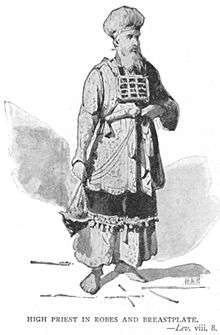Definify.com
Webster 1913 Edition
Ephod
Eph′od
,Noun.
[Heb. ’ēphōd, fr.
'āphad
to put on.] (Jew. Antiq.)
A part of the sacerdotal habit among Jews, being a covering for the back and breast, held together on the shoulders by two clasps or brooches of onyx stones set in gold, and fastened by a girdle of the same stuff as the ephod. The ephod for the priests was of plain linen; that for the high priest was richly embroidered in colors. The breastplate of the high priest was worn upon the ephod in front.
Exodus xxviii. 6-12.
Webster 1828 Edition
Ephod
EPH'OD
,Noun.
Definition 2026
ephod
ephod
See also: éphod
English

A depiction of a high priest wearing robes and ephod (breastplate)
Noun
ephod (plural ephods)
- (biblical, Judaism) A priestly apron, or breastplate, described in the Bible in Exodus 28: vi - xxx, which only the chief priest of ancient Israel was allowed to wear.
- 1769, Oxford Standard text, Bible (King James): Exodus, 28, vi-viii,
- And they shall make the ephod of gold, of blue, and of purple, of scarlet, and fine twined linen, with cunning work.
- It shall have the two shoulderpieces thereof joined at the two edges thereof; and so it shall be joined together.
- And the curious girdle of the ephod, which is upon it, shall be of the same, according to the work thereof; even of gold, of blue, and purple, and scarlet, and fine twined linen.
- 1769, Oxford Standard text, Bible (King James): Hosea, 3, iv,
- For the children of Israel shall abide many days without a king, and without a prince, and without a sacrifice, and without an image, and without an ephod, and without teraphim:
- 1913, Urim and Thummim, article in Catholic Encyclopedia,
- From this it appears that at least towards the close of the Exile, the Urim and Thummim were considered as something distinct from the ephod of the high priest and the gems with which it was adorned.
- 1769, Oxford Standard text, Bible (King James): Exodus, 28, vi-viii,